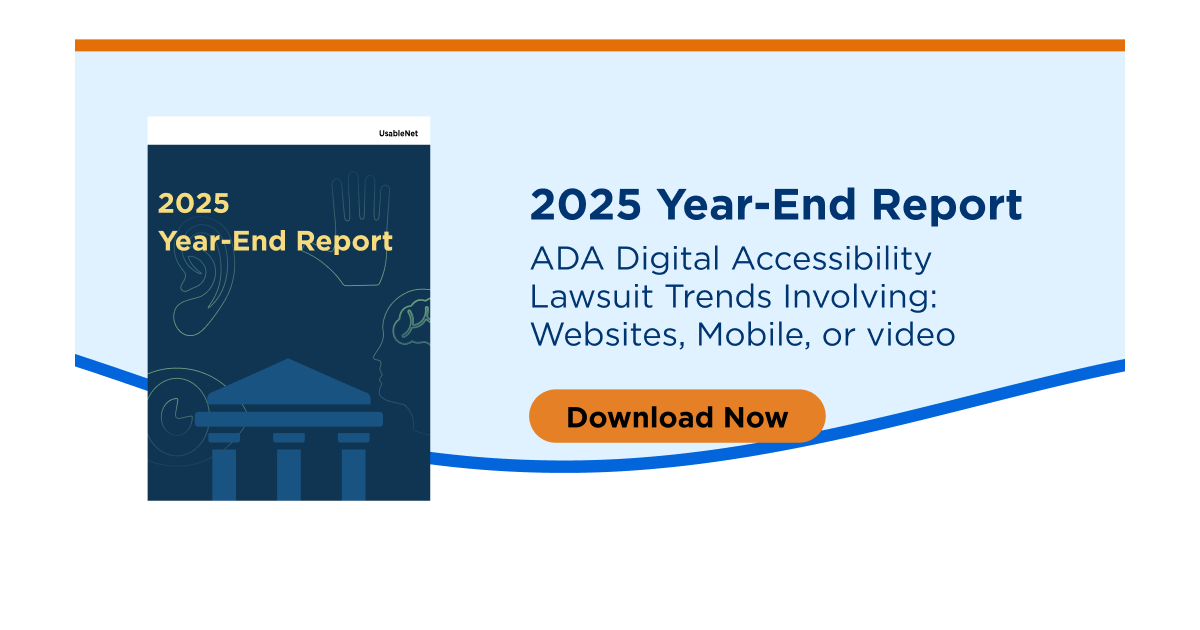On November 12, 2019, I was joined by Michelle Anderson, Partner at Fisher Phillips for a special UsableNet Webinar on how the ADA applies to Website and Apps of not just restaurant but also food service and hospitality companies.
Why Are Hospitality Companies Sued for WEbsite ADA?
The Restaurant and Food Service Industry is the second most frequently targeted by ADA web accessibility lawsuits—10% percent of all federal ADA-based web related filings as of midyear 2019. Equally striking, 72 food service companies (over 16 percent of these legal actions) had previously been sued. The only other industry targeted more was retail in 2018 and 2019 so far is retail.
Restaurant, food service and hospitality websites are popular destinations online for everyone, including members of the disability community. The rise of surfing lawsuits in this area likely follows the popularity going online to complete more tasks in our every-day lives.
When visiting restaurants online, it becomes much faster to visit multiple Websites. A single customer might check several restaurant Websites to find a gluten-free option for Friday nigt dinner or look at multiple Website pages on menu selections and delivery areas in order to find a restaurant open and willing to deliver wings to their neighborhood for Sunday football. But this also means that a user of assistive technology can begin to encounter the same frustrating accessibility issues again and again from Website to Website and across brands.
Related: Watch Joe Di-Nero, Assistive Technology Specialist with Helen Keller Services for the Blind and a Digital Accessibility Tester for UsableNet navigate a good and bad user experience with his assistive technology. Watch the On-Demand Webinar Now.
When a potential customer using assistive technology can't find the information they need, including the phone number our hours to call, that can lead to surges of ADA Websites lawsuits in the same area, or by the same industry and often by the same person who has gone from potential customer to plaintiff.
What does the law say?
Title III of the ADA is from 1990 and does not specifically mention Websites. But it's existing DOJ settlements have set a precedent that Restaurants have an obligation to provide digital accessibility. From the plaintiff’s perspective, the argument is simple—there is precedent from past DOJ legal actions where food companies have agreed to update their websites to confirm with digital accessibility standards such as the WCAG requirements.
Why do plaintiffs sue the same Company multiple times?
Many restaurant and hotel groups have multiple brands with separate websites for each. Unfortunately, one settlement will not cover all future legal actions.
In 2018, 21 percent of all ADA web accessibility actions were filed against restaurants that had been previously listed in a suit. Some restaurant holding companies have been sued seven times or more over 2017 and 2018.
What can a restaurant brand do to prevent or mitigate a lawsuit threat?
When restaurants make digital accessibility a priority, they will not only avoid legal action, but increase their customer base, improve morale, and become an inspiration to others in the industry.
1. Create a plan and tell the world.
Companies should involve legal counsel and key stakeholders from each department who create and maintain their digital properties. Our popular blog post on how to craft an accessibility statement is a good starting point for this.
2. Start accessibility remediation.
This is crucial whether you in a lawsuit, have recently settled, or are lucky enough to have avoided legal action. The plan should cover your website and mobile apps.
No matter your technical skills, UsableNet has you covered for accessibility remediation.
Take our Website Accessibility Remediation Quiz: Which Approach Is Right for Me?
3. Involve members of the disability community.
Ensure your site navigation and user flows are accessible to the widest possible audience by using both an automated test and manual screen reader verification provided by experienced accessibility reviewers or daily users of assistive technology.
Related: How and Why to Design your Site for Screen Reader Compatibility [Blog Post]
4. Maintain accessibility.
With UsableNet Assistive, we shoulder the burden of monitoring your site and dynamically remediate any issues. If these duties fall to your team, our free tool kit on Maintaining Accessibility may help.
For more on this topic, register to watch the Webinar recording here.

As a hospitality brand, you know that changes in taste can have an immediate and profound effect on your business. Your digital accessibility goes beyond individual preference and speaks to a higher standard of service, one that embraces people of all abilities. Start by knowing the landscape, as laid out in our 2018 ADA Web Accessibility Lawsuit Recap Report.
ready to get started? Contact us to book your free Website Accessibility consultation.








